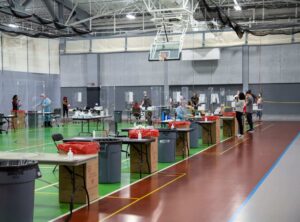by kwheele4 on February 4, 2021
Editorials
Strengthening Our Resolve
by The Cowl Editorial Board 2020-2021

The first week of the fall semester, The Cowl Editorial Board penned an editorial, placed on the front page of our first issue, in which we aimed to deliver a unifying call to action: if Providence College was to remain open for the duration of the semester, we would need to come together as a community, look after our neighbors, and uphold our obligations to one another.
Now, at the start of the spring semester, we again write as an Editorial Board, this time to reaffirm the message we outlined in the fall and to set forth a vision of a successful spring.
With the fall behind us, we know what daily life under pandemic protocol will look like. We made it through an outbreak, and we understand how the College will respond should we have another. We found new ways to connect with one another and to reinvent our favorite PC traditions even in online and socially-distanced settings, and we now look forward to doing the same this semester.
Despite having weathered the storm before, however, we contend now with new anxieties and face new challenges. Chief among those challenges is pandemic fatigue.
Come this March we will have spent a full year in the pandemic, enduring months in quarantine and coping with constantly changing, oftentimes confusing protocols. As we inch closer to that mark, we also approach the end of the academic year. Nearing such big milestones, it can easily feel like time is slipping away from us—time which we had hoped would turn out much differently than it has.
This disappointment, coupled with the boredom and frustration of life in lockdown, is a recipe for fatigue, frustration, and carelessness with the rules and procedures that often feel like obstacles to living out the college experience we had imagined for ourselves.
This frustration and fatigue is a perfectly understandable, human response given the circumstances. Yet the reality is that the pandemic is worse now than it was when we arrived on campus in August, when we came back from an outbreak in September, and when we left for Thanksgiving in November. The pandemic’s deadliest month, January alone saw over 95,000 U.S. deaths, bringing the total loss of life to over 440,000 Americans.
As difficult as it is, we must bear in mind this harrowing reality and refocus ourselves on our responsibility to follow the guidelines established in Rhode Island and on campus. Despite the achievement of making it through last semester, and despite the fatigue we may feel, we cannot grow lackadaisical with our social distancing measures, mask-wearing, and testing schedule. We have an ongoing responsibility to limit our social circles to our pods, and to report honestly with whom we have been in close contact.
The wellbeing of our community depends not only on our safety procedures, but also on our mindset. Only two weeks into the semester, there are already signs that general attitudes on campus are not in alignment with the gravity of the health crisis we are in, because of both fatigue and a growing sense of immunity.
While science has shown that individuals who have contracted the virus are likely immune to it for a short period of time afterwards, thinking one is immune entirely is a toxic mindset that could spread just as quickly on a college campus as the virus itself. A positive test exempts you from weekly testing for a period of time, but it does not exempt you from following COVID-19 protocol established by the College and the State of Rhode Island.
The careless behavior of only a few individuals—whether immune or not—is enough to set a dangerous standard on our campus. We have all grown fatigued with COVID protocol, but allowing a mindset of immunity to permeate campus is a risk we cannot afford to take.
In the fall, we offered a reminder that we needed to contemplate the difficult questions about what we owe one another as members of the same community. We outlined what we stood to lose and the damage we would cause if we ignored guidelines, and we presented a vision of everything we had to gain if we followed them—our collective health and a return to the College we know and love.
We now add one more consideration: it matters how we emerge from this crisis. As the vaccine rollout continues, this could well be the last semester of online classes, weekly testing, and social distancing. This is not a time in PC history—or history in general—that will soon be forgotten, and we still have the opportunity to define how we walk out of it: either united as a community, or wishing that we had done better.
And so, as we look forward to better times, let us strengthen our resolve and reaffirm our commitment to this community and to the common good, mindful of the fact that future generations will someday judge us for the choices we make in the weeks and months ahead.